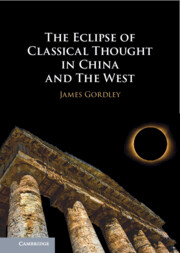Book contents
- The Eclipse of Classical Thought in China and the West
- The Eclipse of Classical Thought in China and the West
- Copyright page
- Dedication
- Contents
- Acknowledgments
- 1 The Dilemma
- Part I Two Ancient Traditions
- 2 The Beginnings of Ethical Philosophy
- 3 The Challenge to Virtue and the Discovery of Human Nature
- 4 A Normative Psychology
- 5 The Universality of Normative Standards
- 6 Justice, Propriety, and the Common Good
- 7 Government
- Part II The Formation of Two Constitutions
- Part III The Eclipse of Classical Thought
- Appendix The Encounter with the Abrahamic Religions
- Index
7 - Government
from Part I - Two Ancient Traditions
Published online by Cambridge University Press: 26 July 2022
- The Eclipse of Classical Thought in China and the West
- The Eclipse of Classical Thought in China and the West
- Copyright page
- Dedication
- Contents
- Acknowledgments
- 1 The Dilemma
- Part I Two Ancient Traditions
- 2 The Beginnings of Ethical Philosophy
- 3 The Challenge to Virtue and the Discovery of Human Nature
- 4 A Normative Psychology
- 5 The Universality of Normative Standards
- 6 Justice, Propriety, and the Common Good
- 7 Government
- Part II The Formation of Two Constitutions
- Part III The Eclipse of Classical Thought
- Appendix The Encounter with the Abrahamic Religions
- Index
Summary
In the Confucian tradition, there was one legitimate form of government. It was an empire to which all civilized people belonged.
In the beginning, Tian conferred the mandate to rule on the emperor Yao (堯). According to Confucius, “Great indeed was Yao as a sovereign! How lofty! Only Tian is great, and Yao modeled himself upon that.” Yao chose Shun (舜), a simple but virtuous farmer, to succeed him. Shun was succeeded by his minister Yu (禹). Confucius said, “How sublime was the manner in which Shun and Yu possessed the empire, and yet effortlessly!” Shun passed the throne to Yu who passed it to his son, thereby founding the first dynasty, the Xia (夏).
- Type
- Chapter
- Information
- The Eclipse of Classical Thought in China and The West , pp. 116 - 136Publisher: Cambridge University PressPrint publication year: 2022

